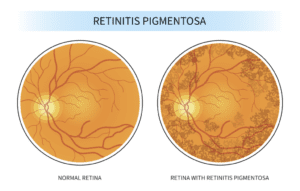Randevu +90 324 238 83 83
Home »
Last updated on August 27th, 2024 at 12:32 am
Home »

Especially, Retinitis Pigmentosa (Night blindness) is an eye disease that is seen in every 4000 people due to the inherited retina. Particularly, Retinitis Pigmentosa disease affects the retina of our eye. Generally, the retina is the nerve layer that lines the back of the eye that is sensitive to light. Also, This is a slowly progressive disease and causes a definite loss of vision in its later stages.
Additionally, Retinitis Pigmentosa is part of a family of inherit eye diseases. Also, all types of the disease affect the retina’s ability to perceive light. Therefore, the problem with the retina can occur in any of the following:
Especially, Retinitis Pigmentosa symptoms usually begin in childhood or adolescence. However, each patient may experience symptoms differently. Particularly, in some people the disease progresses slowly and causes severe vision loss over time. However, in some patients, they lose their sight much faster and more severely.
Additionally, symptoms of the disease may look like other eye diseases. Consult your eye doctor for diagnosis.

Especially, our ophthalmologist will conduct your eye examination after a detailed evaluation by asking questions about your history to identify the problem you are experiencing. Also, our ophthalmologist may perform one or more of the following tests to make a diagnosis:
Generally, our eye doctor will find the best treatment for you based on:
Especially, consult your ophthalmologist for an accurate diagnosis, as the symptoms of disease can sometimes resemble those of other retinal diseases.
Especially, with the diagnosis of RP disease, the progression of the disease can be stop or slow down. Also, it is possible with subtenon PRP (platelet rich plasma) or the Wharton jelly Stem cell treatment apply to the patients in this situation. Particularly, the aim of this treatment is to slow or stop the progression of retinitis pigmentosa disease treat with PRP or Wharton’s jelly-derived mesenchymal stem cells.
Moreover, treatment with Wharton’s jelly-derived mesenchymal stem cells in the early stages is considered an effective and safe option to slow or stop the progression of disease without any adverse effects.
Especially, if you suspect that you have Retinitis Pigmentosa, we recommend that you see a retinal specialist ophthalmologist as soon as possible. Also, you can get information about the treatment of the disease by applying us and book for appointment for an examination from our specialist eye doctor.
Strabismus Crossed Eye Squint Treatments. Diabetic Retinopathy Disease. Macular Degeneration Treatments. Glaucoma Disease and Treatments. Dry Eye Syndrome Treatments. Periodic Eye Examinations.
Randevu +90 324 238 83 83
